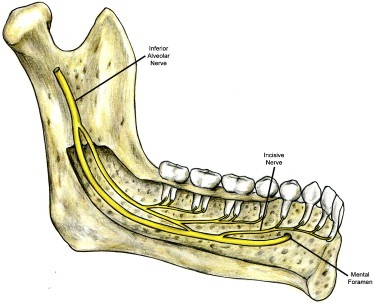When Dental Infections Reach the Inferior Alveolar Nerve: Causes, Treatment & Lessons for Patients
Dr. Yasin Al-Safadi

Dental infections are more common than many people think but when an infection spreads deep into the jaw, it can sometimes affect one of the most important nerves in your face: the inferior alveolar nerve (IAN). This nerve supplies sensation to your lower teeth, chin, and lower lip, and any inflammation or pressure around it can cause discomfort, numbness, or even pain.
Let’s understand how this happens, how it’s treated, and what every patient can learn from it.

How Infections Reach the Inferior Alveolar Nerve?
The inferior alveolar nerve runs inside a bony canal within the lower jaw, very close to the roots of the molar teeth especially the second and third molars. When a tooth infection is left untreated, bacteria and inflammatory fluids can spread beyond the root tip and into the surrounding bone.
Here’s how it happens step by step:
- Deep decay or failed root canal treatment allows bacteria to reach the pulp.
- Pulpal necrosis (death of the nerve inside the tooth) leads to abscess formation.
- The infection spreads into the bone around the root apex.
- If the tooth is close to the inferior alveolar canal, the infection can compress or irritate the nerve.
Other possible causes include:
- Traumatic extractions of lower molars.
- Over-instrumentation or extrusion of root canal materials into the canal.
- Jaw fractures or cystic lesions close to the nerve pathway.
Common Symptoms:
When the inferior alveolar nerve is affected by infection or inflammation, patients may experience:
- Numbness or tingling in the lower lip, chin, or teeth (paresthesia).
- Pain or burning along the jawline.
- Difficulty chewing or speaking due to altered sensation.
- Toothache that spreads or feels “deeper” than usual. These symptoms can appear suddenly or develop gradually if the infection progresses slowly.
Treatment Options
The main goal is to eliminate the source of infection and reduce pressure or inflammation on the nerve. Treatment depends on how advanced the infection is:
1. Early Stage (Before Nerve Damage)
- Root canal treatment or retreatment to disinfect the tooth.
- Antibiotic therapy (if infection is spreading or there’s swelling).
Pain management and warm saline rinses to reduce inflammation.
2. If Nerve Is Already Affected
- Surgical drainage or apicoectomy to remove infection near the nerve.
- Extraction if the tooth cannot be saved.
- Steroid or anti-inflammatory medications to reduce nerve swelling. In some cases, nerve support supplements (like B-complex vitamins) are prescribed to aid healing.
3. Severe Cases (Persistent Numbness or Damage)
- Referral to an oral and maxillofacial surgeon for evaluation.
- Microsurgical decompression or repair if the nerve is physically compressed. Recovery can take weeks to months, depending on the extent of nerve irritation.
Lessons for Patients:
- Never ignore dental pain or swelling: What starts as a small cavity can become a serious infection spreading to deep structures.
- Get timely root canal or extraction when advised: Delaying treatment increases the risk of infection reaching the nerve or bone.
- Regular dental check-ups are your best defense: Early X-rays can detect infections before they reach critical areas like the nerve canal.
- Report numbness immediately: Tingling or loss of feeling in the chin or lip is a red flag it needs urgent dental evaluation.
Final Thought:
The inferior alveolar nerve plays a crucial role in facial sensation, and once affected, recovery can be slow. But with early diagnosis, proper dental treatment, and follow-up, most cases resolve completely without permanent damage. So next time your dentist recommends a root canal or extraction remember, it’s not just about saving a tooth; it’s about protecting your nerve, bone, and overall oral health.